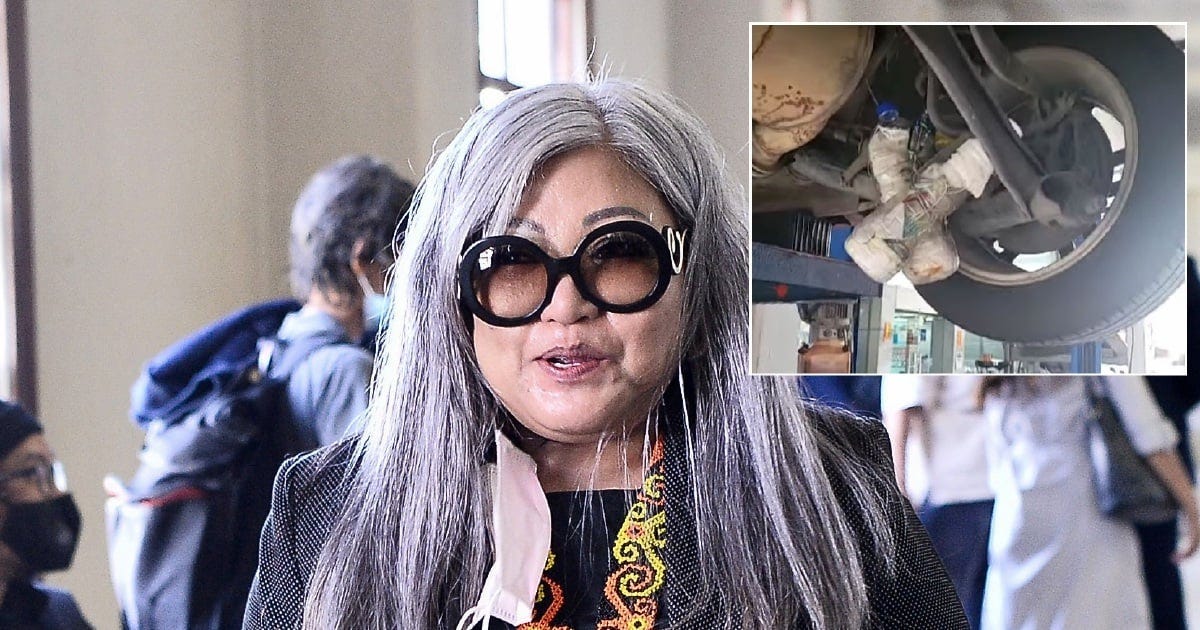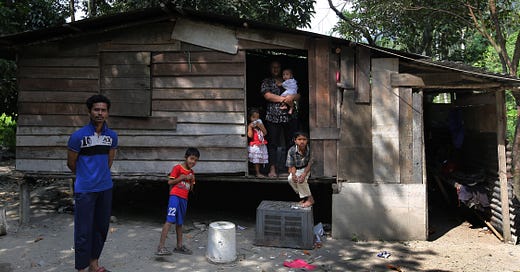
Domestic terrorism comes to Malaysia
Attempted assassination of lawyer/activist Siti Kassim crosses red line
On June 21, the activist lawyer Siti Kassim took her car to an automobile center in the Bangsar district of Kaula Lumpur to service it before she drove across the peninsula to Kelantan to handle a case for the indigenous community known as the Orang Asli, or first people.
When the car was raised on the hydraulic hoist, the serviceman found a bomb rigged to the underside. The bomb squad, which took an hour and a half to arrive, cordoned off the area. The device was taken off the car, photographed, and then destroyed by a controlled explosion, destroying much of the evidence.
The crude IED, consisting of two bottles and wires, was found behind the rear tire of the car. It was most probably attached to Siti’s car in the early hours of the morning in her apartment building carpark and was set to explode as heat built up while driving. Fortunately, her drive to the automobile service center was a very short one. The bomb was said by police to be powerful enough to have almost certainly killed her, had she been in the car when it exploded.
Attempted assassination met with silence
Siti Kassim is an activist lawyer who takes up legal cases no one else wants to take, on behalf of the marginalized and discriminated against. Most of her work is done pro-bono and she has specialized in the plight of the Orang Asli over the years. She is a member of the Malaysian Bar’s human rights committee and the deputy co-chair of the Committee on Orang Asli Rights and has defended indigenous communities against human rights violations by logging and mining interests on their lands. She is also a prominent advocate for the LGBTI community. She has often offended some ulamas, or Islamic councils, and conservative Muslim groups. She has been critical of governments over the years, and often received the wrath of politicians.
What is surprising is the silence of politicians over the attempted bombing. Prime Minister Anwar Ibrahim, the communications and multimedia minister Fahmi Fadzil, the minister for law reform Azalina Othman Said, and home minister Saifuddin Nasution Ismail have all been silent, as well as all of the rest of the cabinet and all opposition members.
In addition, most NGOs and liberal Malay groups have also remained quiet. There has even been condemnation of Siti on social media for her liberal views, which are despised by more conservative Muslims. Some of the more extreme have gone as far as saying, padam muku dia, or she deserves it.
With the state elections in Kelantan, Terengganu, Kedah, Penang, Selangor, and Negeri Sembilan coming up on August 12, no politician is brave enough to take a stand on the issue out of fear that some in the Malay community will see them as sympathetic with Siti’s liberal views, costing them potential electoral support in conservative states.
Origin of the IED
After four days, the police have not made any announcements over progress in the case.
Most IEDs have signatures indicating where they may have been made, and by whom. On conferring with Thai experts in the country’s Deep South, they confirmed that the construction of the IED was similar to what is sometimes used in Patani, Yala, and Narathiwat.
The experts told Asia Sentinel that some of these bombs are constructed in Rantau Panjang, on the Kelantan side of the Kolok River in Malaysia, and taken by third parties to their potential targets. The homemade IEDs are purchased by these parties. Consequently, there is a probability the IED was made either in Rantau Panjang, or the bomb makers came to Kuala Lumpur and made the IED in some unknown location.
The Thai-Malaysian border is extremely porous, where insurgents in Southern Thailand are often supplied weapons from Kelantan.
Although there have been two other bombs found within the Kuala Lumpur areas this year, this is the first politically motivated use of an IED to scare or kill a political target. The lack of pushback against such tactics by the government may encourage further similar attempts on targeted individuals. If the Southern Thai-Rantau Panjang Malaysia connection is verified, then weapons designed and made for the Deep South insurgency will become the preferred tool for terrorism in Malaysian, with a connection with the Thai insurgents.
Malaysia has turned a blind eye to fighters involved in the deep south insurgency, using northern Malaysia and a safety zone from Thai forces. There is now a possibility, extremists in Malaysia are working with them.
The Anwar administration has made a very weak response to an act of domestic terrorism carried out upon a political identity. This inept approach may open the flood gates to further terrorism attempts, due to no political will to prevent them.
It’s a great concern how far this could go. There have been past cases of so-called enforced disappearances. In April 2022, the Human Rights Commission of Malaysia (SUHAKAM) released the results of its public inquiry into Christian convert Joshua Hilmy and wife Ruth Sitepu, who had been missing since 2016 and found that they were victims of enforced disappearance, according to the US State Department’s annual report. Then-SUHAKAM Commissioner Mohd Hishamudin Yunus, who chaired the inquiry, said the commission found no evidence that Hilmy and Sitepu were abducted by “agents of the state,” but concluded authorities failed to investigate the case “diligently and seriously.”
Amre Che Mat, another rights worker, also disappeared in 2016, never to be found. In 2019, the SUHAKAM found the disappearance was carried out by the Special Branch of the Royal Malaysian Police. But there has never been a resolution of the case.
It’s a great concern how far this could go.
Originally published in the Asia Sentinel 25th July 2023
Subscribe Below:
















We are getting ahead of the story here. We still don't know the nature of the so-called "bomb". The police have said the material in the bomb could cause a fire, or catch fire. This is not the definition of a bomb, not by a long shot. The full report must indicate if this was actually an explosive device or not.
Attempted assassination of a lawyer? really?.
Siti Kassim can't live without a headline even if it means giving the nation the bird and resorting to vulgarity at the expense of whats left of her dignity and making up stories of fictituous assassins.
The commissioner of police has categorically stated in no uncertain terms that the police have no suspect in the matter but what he refers to as "witnesses" into this rather bizarre complaint by Siti.
Siti appearss to be courting publicity in what some say is a prelude to her tilt at a parlimentary seat in a yet unnamed constituency in one of the states giong to the polls soon.
She is said to be a human rights advocate. An advocate without a mandate relying heavily on a mythical concept of Human Rights. I suppose by that she means the right to offend conservatives and decent humans who reject her brand of Human Rights advocacy consisting of bald allegations against all and sundry, vulgarity and unverifiable claims of attempted assassinations likely to blow up in her face.